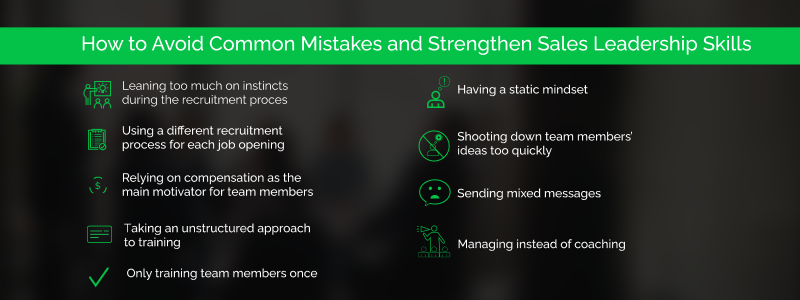How to Avoid Common Mistakes and Strengthen Sales Leadership Skills

Your leadership skills shape the success of your sales team – are you making these mistakes?

As a sales leader, you have high expectations for your sales team. You want to hit sales goals out of the park, and if the leaderboard’s lagging and the pipeline looks empty, it can be easy to lay the blame on your team members. You may feel like they’re not trying hard enough or aren’t using the right sales tactics.
Extra training or development may be in order. But you must also look at yourself and your leadership style. The way you build and lead your sales team has a significant impact on its success. To protect your organization, improve your sales numbers, and optimize the potential of your sales team, avoid these common mistakes.
1. Leaning too much on instincts during the recruitment process
Strong instincts are vital to business success, but when building your sales team, you shouldn’t rely exclusively on your instincts. Your first few hires may be instinct-driven, but as you shift from founder selling to growth mode, you need to create a strategic, data-centered approach to hiring and recruiting.
2. Using a different recruitment process for each job opening
Develop a repeatable recruitment process that includes well-written job descriptions, AI to filter through applicants, initial screening interviews on the phone, and thoughtful questions that help you identify the best talent fit during in-person interviews.
By embracing these elements in your recruitment process, you build a team based on facts and data. You also create a process that different people can handle. As you scale, these types of workflows are critical so that you can delegate without sacrificing quality.
3. Relying on compensation as the main motivator
A competitive salary can help you attract and retain talent, but it shouldn’t be the only trick in your bag. To attract talent, you need the right mix of salary, commission, benefits, and workplace culture.
People want meaning from their jobs. This is especially true of the millennial and centennial (Gen Z) generations. To retain employees, you need to foster a supportive organizational culture. Don’t just tell your team what to do. Help people develop their professional skills.
You want employees to feel loyal to the company, not just to their paychecks. Find ways to reward loyalty. This will build the team’s internal motivation. People tend to work harder when they’re intrinsically motivated.
4. Taking an unstructured approach to training
As you build your sales team, you want to ensure everyone is on the same page. You need salespeople who understand your products and services, your brand messaging, and your customer onboarding process. If they don’t understand these elements inside and out, they won’t be able to engage with sales prospects as effectively, and your business will miss out on opportunities.
A structured, memorialized training process is critical. You need to develop a sales training process that covers every detail and sales strategy you want your sales team to have. Then, you need to refine your approach based on what you learn as time goes by.
5. Only training team members once
Training your sales team cannot be a onetime thing. Training when you onboard new team members is essential, but you need to continue the process. People learn through repetition.
Hold weekly or monthly meetings where you talk about sales goals, strategies, accomplishments, and mistakes. You may also want to do daily microtraining to brush up on old skills, learn new ones, and warm up for the day.
6. Having a static mindset
Effective leaders know they don’t know everything. They see opportunities for self-improvement, and they’re open to learning. They learn from their mistakes because they have a growth mindset, but they also learn from the salespeople on their team.
7. Shooting down team members’ ideas too quickly
Even once you have a developed training and sales process, there is still room for improvement. Sometimes, sales leaders are so focused on their sales tactics or their vision of success that they forget to take others’ ideas into account.
If you find yourself shooting down team members’ ideas quickly, stop. Take time to listen. Your team members are in the trenches. They’re the ones dealing with sales prospects and customers every day. They often have insights that you need.
8. Sending mixed messages
Sometimes, your goals can be at loggerheads with each other. For instance, you may want to prioritize customer service, but you may also want to increase your sales numbers. You may provide detailed instructions about what you expect, but then tell people to use their own discretion. Pay attention to the messaging you give your sales team and make sure you’re not sending mixed messages.
Your sales team can give you a lot of insights into your messaging. Sometimes, employees may have direct feedback. In other cases, if they seem stressed or unable to follow directions, find out why. If you learn that you’re sending mixed messages, step back, reassess your goals, and get everyone back on the same page.
9. Managing instead of coaching
The right leadership style is critical if you want to optimize the talent on your team. Traditional management styles focus on direction, oversight, and correction. Managing is a top-down process. You deliver directives, and the team follows. That doesn’t always work in sales.
Coaching focuses on partnership and exploration. Rather than being a leader who cracks the whip or looks over your team members’ shoulders all the time, you want to be a partner in their success. You show them the way forward. You help them develop their potential and learn from their mistakes.
Leading a sales team is a delicate art. You need aspirational goals that drive your team to try harder. But at the same time, you don’t want goals that are so tough that they don’t motivate the team. You want people to follow the rules and standards of your company, but you also want them to develop their instincts on the best way to deal with prospects.
The right approach to leadership is critical if you want a strong sales team. We can help. At MetaGrowth, we help entrepreneurs build their sales teams. We help you create processes that improve recruitment, training, and retention. Ready to take your organization to the next level? It all starts with sales. Contact us today if you’re ready to strengthen your approach to sales leadership.
Written by
Joe Arioto
